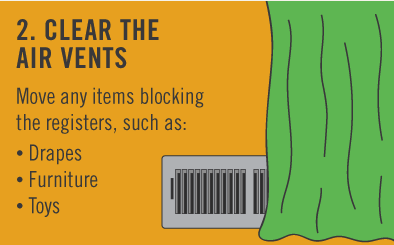Lots of home owners are familiar with heating systems, which heat homes with oil or natural gas and push hot air via ductwork. They are relatively cost-effective and can provide trustworthy heating even during a winter season power outage.
However, they use nonrenewable fuel sources and produce carbon monoxide gas and other air contamination. They also aren't as energy-efficient as a high-efficiency heatpump.
Price
Typically, heatpump are extra budget friendly to run than furnaces. They commonly use power and refrigerant to essence warmth from outside air, and afterwards move it right into your home. You can capitalize on less costly electrical energy prices throughout off-peak hours to better lower your heating costs.
Unlike heat pumps, gas or wood-burning heating systems make use of combustion to produce warmth, producing flue gases right into the atmosphere that can be hazardous to your health. These heating systems are likewise much less energy-efficient than heatpump, and their higher operating expense can build up over time.
Furnaces are more difficult than heatpump and require regular upkeep to make certain the correct function of all components. Despite https://costtoreplaceacunit43197.blogdeazar.com/29441047/exploring-the-environmental-benefits-of-warm-pumps-a-sustainable-heating-solution , they tend to last longer than heat pumps with a regular life-span of 20 years or even more. Nevertheless, you'll need to consider the expense of gas, fuel oil or wood and the extra devices required for installment and procedure such as ducts and ventilation systems.
Power Effectiveness
Heatpump have a greater power effectiveness ranking than furnaces. These systems use power to feed on heat from the air, even in freezing temperatures. They can additionally remove excess warmth from the home throughout warmer months and recycle it to cool down the system. Provider professionals can aid you identify the most effective design for your home on climate and resource power expenses.
Furnaces melt fuel oil, lp, natural gas or various other kinds of nonrenewable fuel source to heat the air in the home. This air is after that dispersed via ductwork making use of a huge follower. Furnaces produce greenhouse gases and need routine maintenance and tools upgrades to make sure risk-free procedure.
The biggest advantage of a heater is that it can be operated also in extreme winter conditions since it does not count on exterior temperatures to warm up the air. Furnaces additionally have a longer life-span than heat pumps and generally last 15 years. They can additionally be coupled with double fuel choices, which select one of the most reliable home heating alternative based on the weather.
Environment
Heatpump function well in modest climates and use less resource energy than furnaces. Nonetheless, if your area is remarkably cold, you might need to purchase a standard gas heating system rather.
Furnaces offer cozy, cozy warmth and usually provide fast heating to elevate interior temperature levels. These systems can be utilized with a selection of fuel kinds, consisting of gas, lp, oil or electricity.
They take in much more energy than heat pumps-- approximately 3x as much-- and call for ductwork that's costly to mount or retrofit. They're also more pricey to maintain, as they can create air top quality issues and create greenhouse gas discharges.
If you're devoted to minimizing your carbon footprint, a heatpump is a good selection for your home. https://www.cmmonline.com/news/new-cdc-ventilation-guidelines-help-stop-the-spread-of-covid-19 have fewer greenhouse gas emissions than heating systems, especially if you choose a power CELEBRITY ® heat pump. Your regional copyright expert can clarify the differences between these 2 heater and help you make the most effective decision for your special demands.
Individual Preferences
Heaters can be really energy efficient when powered by gas, gas or oil, however they aren't as power effective as heat pumps in frigid environments. They can likewise be more costly to mount, calling for gas lines and ventilation systems.
Nevertheless, heaters have a tendency to call for less upkeep, which can result in lower recurring costs. They generate fewer greenhouse gases and are extra trusted than heat pumps during extreme weather condition.
Electric heat pumps are much more functional in creating interior convenience because they can also serve as air conditioning unit during warmer months. They can be easier to keep, needing only routine air filter changes and periodic vacuuming.
If you prefer the convenience of a solitary system that does it all, think about a hybrid heating remedy that sets a furnace with an electric heat pump. These systems can immediately switch between both home heating options based on your home's demands and temperature level problems, optimizing performance and savings.
